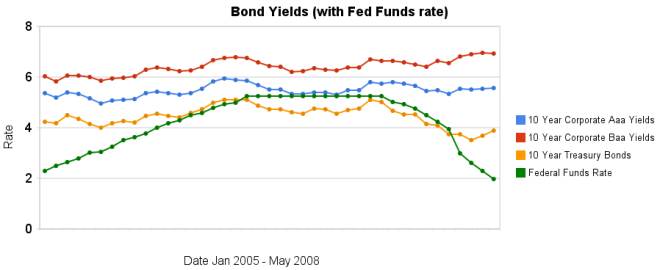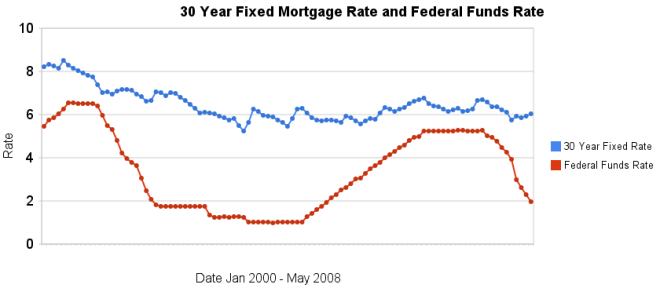U.S. Consumer Prices Jumped in June by the Most in 26 Years
…
Prices increased 5 percent in the 12 months to June, the most since May 1991. They were forecast to climb 4.5 percent from a year earlier, according to the survey median. The core rate increased 2.4 percent from June 2007, also more than forecast.
Energy expenses jumped 6.6 percent, the biggest gain since the aftermath of Hurricane Katrina in September 2005. Gasoline prices soared 10.1 and fuel oil jumped 10.4 percent.
…
Rents which, make up almost 40 percent of the core CPI, also accelerated. A category designed to track rental prices rose 0.3 percent after a 0.1 percent gain in May. Today’s figures also showed wages decreased 0.9 percent in June after adjusting for inflation, the biggest drop since August 1984, and were down 2.4 percent over the last 12 months. The drop in buying power is one reason economists forecast consumer spending will slow.
The continued increase of inflation is a serious problem. Eventually the federal reserve needs to take serious action (raising the discount rate). And the politicians need to stop raising taxes on the future to spend more and more every year. Their continued financial irresponsibility is a large part of the reason for the declining value of the dollar – along with the voters that keep electing those proposing large increases in spending while pushing off paying for that spending to future tax increases.
Related: inflation investment risk – Food Price Inflation is Quite High – Bernanke warns of inflation – Politicians Again Raising Taxes On Your Children – USA Federal Debt Now $516,348 Per Household
Read more

Over the last 2 months the yields on bonds have increased the discount rate has continued to decline.
The spread between corporate bond yields and government bonds has decreased a bit as treasury yields have increased 37 basis points compared to just 4 and 6 basis point increased in corporate bond yields.
Data from the federal reserve – corporate Aaa – corporate Baa – ten year treasury – fed funds
Related: Bond Yields 2005-2008 – 30 Year Fixed Mortgage Rates versus the Fed Funds Rate – Initial Retirement Account Allocations
This year, the average discount rate has fallen every month while the average 30 year mortgage rate has climbed all but 1 month (a 5 basis point drop). In January, 2008 the discount rate averaged 3.94% and 30 year conventional fixed rate mortgages averaged 5.76%. In May, 2008 the discount rate had fallen to 1.98% (for a 196 basis point drop) and 30 year conventional fixed rates had risen to 6.04% (for a 28 basis point increase).
The chart shows the federal funds rate and the 30 year conventional fixed rate mortgage rate from January 2000 through May 2008 (for more details see: historical comparison of 30 year fixed mortgage rates and the federal funds rate).

Related: Affect of Fed Funds Rates Changes on Mortgage Rates – real estate articles – Bond Yields 2005-2008 – Jumbo and Regular Mortgage Rates By Credit Score
Read more
Central bank intervention … unprecedented in scale and scope by Brad Setser
…
As around $900b, the fed’s balance sheet is something like 6-7% of US GDP. With $1600b in foreign assets, the PBoC’s external balance sheet alone is more like 50% of China’s GDP.
…
But with Martin Wolf now arguing that scenarios with more than a trillion in credit market losses cannot be ruled out – even more unprecedented central bank — and government — action cannot be entirely ruled out. The scale of the “great unwind” has been stunning. The pace of change in the policy debate only slightly less so.
Related: Fed takes leap towards the unthinkable – Goldman Sachs Rakes In Profit in Credit Crisis – Misuse of Statistics: Mania in Financial Markets – Why do we Have a Federal Reserve Board?
Fed Plans To Curb Mortgage Excesses, way late but at least they may do something.
Yes the Fed should have taken more aggressive action. But the legislators should not throw stones at others – what have they done? A recent example – they want to lower the down payment required for FHA loans to 1.5%. I can’t take anyone’s opinion, of how others should have behaved seriously, when they vote for such legislation in the midst of a subprime mortgage loan crisis. What are these people thinking. Ok, everyone now says loan standards were to lax, people stopped putting 20% or even 10% down on home purchase. Ok, lets blame the Fed and then lower the down payment required for federal backed mortgages to 1.5% (from the already very low 3%). Did this crazy legislation just barely squeak by? Nope, passed the senate 93-1! Lets have the politicians explain what they have done right before they just criticize others. Their game of blaming others while doing next to nothing positive themselves is sad.
Another real voice of reason. The Mortgage Bankers Association (MBA) really expects anyone to pay any attention to their opinions. They have someone managed to create a threat to the economy so large that $90 a barrel oil is not the threat to the economy people are worried about. I think anyone that reads these opinions from the MBA and doesn’t see them as self serving statements and nothing else should be ashamed of themselves. Shouldn’t the Washington Post at least include some follow up question on why the public should listen to that organization. What was there senior vice president saying 5 years ago to ensure the economy wasn’t threatened by the reckless action of their members? We seem to have forgotten that individuals and organization should be held accountable for their actions. Quote some people that are not only concerned with their benefits without regard for what it does to everyone else. If that is not what they are doing, lets see 5 policy recommendations they have made in the last 5 years that are good for America and bad for you and your members. I don’t think the rest of us believe what is good for the MBA is good for America.
Related: Why do we Have a Federal Reserve Board? – Ignorance of Many Mortgage Holders – How Not to Convert Equity – Washington Paying Out Money it Doesn’t Have – Legislation to Address the Worst Credit Card Fee Abuse (Maybe) – Lobbyists Keep Tax Off Billion Dollar Private Equities Deals and On For Our Grandchildren
|
Jon Stewart is a Genius
Jon Stewart asks Alan Greenspan an excellent question:
Why do we have a Fed? Why do we have someone adjusting the rates if we’re a free-market society? Alan’s answer is not satisfying, but I don’t blame him: The economics profession does not have a good answer. We economists have rigorous and fundamental theory to explain why we have environmental regulation (externalities) and to explain why we have antitrust laws (market power), but there is no consensus about what market failure calls for the existence of a central bank. The answer has something to do with the benefits of a system of fiat money. And it has something to do with the possibility of short-run monetary nonneutrality… |
Nice post from the recent Chairman of the Council of Economic Advisers to President Bush and current Harvard professor. If I remember right he was in consideration to serve on the Fed. I also don’t think he is questioning the regulatory role of the Fed but the interest rate and monetary policy.
Related: Bernanke Calls for Stronger Regulation of Mortgages – Investor Protection Needed – What is the Fed Funds Rate?